 Image search results - "Otsu" Image search results - "Otsu" |
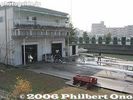
Seta Rowing Club's 2-story clubhouse located in Otsu, Shiga Prefecture. The club is a registered NPO. The club is named after Seta River at the southern tip of Lake Biwa. Regattas are also held on the river, Lake Biwa's sole outflowing river.
|
|

Being my first regatta, I was at first daunted by the rowing terminology for the different types of boats.
|
|
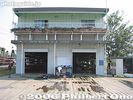
Seta Rowing Club's clubhouse. Boats are stored on the bottom floor, while the 2nd floor has office space, ergo machines, meeting room, locker room, etc. Web site here
|
|

Carrying back a single sculling boat
|
|
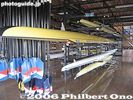
Oars and boats stored on the bottom floor. The club offers 2-hour rowing lessons on Sundays during May to Nov. Address: 6-1 Ogaya, Otsu, Shiga 520-2144 Japan. Phone/Fax: 077-545-9961, Email: info@setarc.jp
|
|

The place was not as crowded as you would think.
|
|
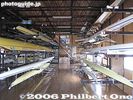
Many boats are made in Italy.
|
|

Rowing team from Nagahama
|
|
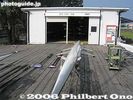
Right across the clubhouse is the Annex boat house.
|
|
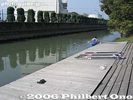
Club's boat dock. This narrow canal leads to Lake Biwa.
|
|

Azaleas in full bloom along the lake edge
|
|
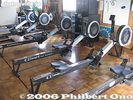
Rowing exercise machines called "ergometers" or "ergo" or "indoor rower." In Japan, they call it "ergo." エルゴThe machine measures the energy you expend rowing. Also measures how fast and far you rowed if you were on water. They even have ergo rowing contests which is a sport itself.
|
|
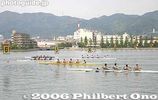
Four-man boat race. There were also foreign rowers from international schools.
|
|
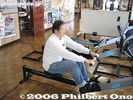
The rowing lesson starts with an ergo workout.
|
|

Cheering section for Nagahama
|
|
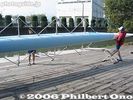
Carrying the boat.
|
|

The gateway to the Seta area is Karahashi-mae Station.
|
|
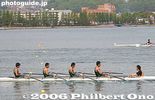
Four-man race with the cox at the stern
|
|

On July 29, 2007, this regatta was held for the second time. It targets mainly beginner rowers. Organized by the Seta Rowing Club which seeks to have more people enjoy water sports on Lake Biwa. Seta-Karahashi Bridge was the regatta's starting line. The Lake Biwa Rowing Song CD was awarded to all the 1st, 2nd, and 3rd place winners in all five categories.
|
|

The 6th annual Lake Biwa Kaitsuburi (Little Grebe) Regatta was held on Sept. 16, 2007. This regatta is mainly for ordinary people of all ages wanting to row. Lake Biwa Rowing Course (Biwako Sotei-jo) in Otsu, Shiga. 滋賀県立琵琶湖漕艇場
|
|

Otsu Prince Hotel, the main venue of the 11th Shiga Kenjinkai International Convention held Nov. 12-14, 2007.
|
|
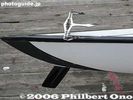
Sleek rudder and steering cables
|
|

Keihan train at Karahashi-mae Station.
|
|

Starting line. The man says "Yoi" (Ready) then "Go."「用意」、次いで「ゴー」
|
|

Sixty rowing teams (300 people) rowed in five categories, including beginner and expert rowers, ranging in age from junior high to senior citizens.
|
|

The regatta started at 9 am, and ended at about 4 pm. Omi-Ohashi Bridge in the background.
|
|

Convention Hall Omi at Otsu Prince Hotel. 第11回滋賀県人会世界大会のメイン会場。
|
|
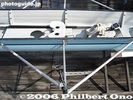
Rowing seat with moving seat on rails, fixed shoes, and outrigger for the oar.
|
|

Seta-no-Karahashi Bridge with the new paint job in 2012. 瀬田之唐橋
|
|
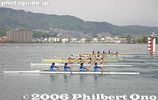
Four-man race starts with the cox at the front.
|
|

The photo above shows part of the stone monument for the first verse of the song. It reads "Ware wa Umi no Ko" (We're children of the lake). [url=http://photoguide.jp/txt/Lake_Biwa_Rowing_Song]More info about Lake Biwa Rowing Song here.[/uThis is the song's first and most famous line. The monument is in a small park near the former boathouse in Mihogasaki pier. The photo has been digitally altered (the colors are not real).
I visited and photographed all the places mentioned in the song as well as all the song monuments in Otsu, Omi-Maiko, Imazu, Chikubushima, Hikone, Chomeiji, and Okaya (Nagano). I also created some digital images to match the scenes mentioned in the song.
|
|

This is the boat dock where people got on and off the boats. The boats were provided by local rowing organizations. The regatta was organized by the Seta Rowing Club in Otsu.
|
|

The regatta was set for 300 meters. It was a hot, summer day.
|
|

Entrance to convention hall at Otsu Prince Hotel. Every few years, all the Shiga Kenjinkai in Japan and overseas gather for a convention for a few days.
|
|
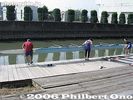
Carrying the boat to water.
|
|

The original Seta-no-Karahashi Bride was the site of historic battles. It has two bridges, one long and one short going over an island in the river.
|
|

Off they go
|
|

A rowing team leaves the dock for Seta-Karahashi Bridge seen in the background.
|
|

"Lake Biwa Rowing Song" was played all day long over the PA system.
|
|

Reception counter. The 11th Shiga Kenjinkai International Convention was held in Shiga for the first time in 16 years. There are currently 71 Shiga Kenjinkai groups in Japan and overseas.
|
|
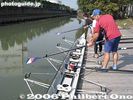
Inserting the oars into the outriggers.
|
|

The current bridge was rebuilt in 1979 and painted a beige color.
|
|
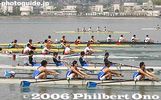
Close-up of rowers at Asahi Regatta
|
|

Seta-Karahashi Bridge, the start line.
|
|

Finish line.
|
|

Main venue at the convention hall. A Shiga Kenjinkai is a group or association of people having ties to Shiga Prefecture who now live outside Shiga.
|
|
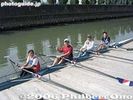
Ready to row on a "quad" sculling race boat. Each person rows with two oars.Sorry for the small image.
|
|
|

Cheering section
|
|

Up to four rowing teams raced down a 250-meter straight course.
|
|
|

There is at least one Shiga Kenjinkai in all the prefectures in Japan, and around 15 Shiga Kenjinkai overseas. The hall was lined with banners of many Shiga Kenjinkai from Japan and overseas. Ehime, Brazil, Osaka, etc.
|
|
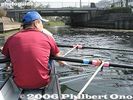
We now enter Lake Biwa.
|
|
|

High school spectators near the finish line
|
|
|

The main boat type used was the "knuckle four," a boat developed in Japan for stability rather than speed. Good for beginners.
|
|

Toronto, Nagano, Hakodate, Argentina, and Kochi. Outside Japan, there is a Shiga Kenjinkai in Brazil, Peru, Mexico, Canada (Toronto, Vancouver, and Alberta), Argentina, USA (Seattle, California, and Hawaii), Hong Kong, Indonesia, UK, France, and Germany.
|
|
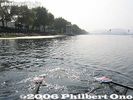
Lake Biwa Rowing Course operated by Shiga Prefecture for major rowing regattas. It is near the head of Seta River, and very near Seta Rowing Club.
|
|
|

Kyoto University's cheering section for the 8-man raceComplete with cheerleaders.
|
|
|
|

Kita-Kyushu, Southern California (Nanka), and Hiroshima
|
|
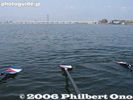
Oars keep the unstable boat stable.
|
|

Seta-no-Karahashi Bridge in autumn. 瀬田之唐橋
|
|

Eight-man race
|
|

All the boats are held stationary with a rope provided from the bridge.
|
|

Awards ceremony was held from 2 pm after each final race was completed.
|
|

Western Canada, Yamaguchi, and Miyagi
|
|
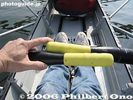
The oar handles overlap when you pull them. Often my hands bumped into each other.
|
|
|
|
|
|

1st, 2nd, and 3rd place winning teams received a trophy, certificate, and Lake Biwa Rowing Song CD. The CD was donated by Philbert Ono.
|
|

Saitama, Kanagawa, France, Matsumae
|
|
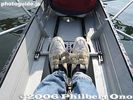
Shoes are fixed to a small, angled platform.
|
|

Water intake for Lake Biwa Canal No. 2. Near Mihogasaki in Otsu, and adjacent to the boat racing arena.
|
|
|

Kyoto Univ. comes in 3rd place
|
|
|
|

Awards ceremony. The presenter is Shigeru Aoyama, the director of the Lake Biwa Rowing Course.
|
|
|
|
|
|
|

Trophy for you.
|
|

Japanese-English interpreting was provided
|
|
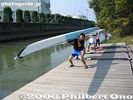
After a neat rowing trip, the boat is lifted out of the water.
|
|

Seta-no-Karahashi Bridge with the new paint job in 2012.
|
|
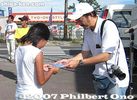
Lake Biwa Rowing Song CD presented to a winner. A CD was also presented to the regatta's youngest and oldest rower.
|
|

Starting line staff
|
|
|
|

Opening ceremony started at 10:30 am on Nov. 13, 2007.
|
|

Rinsing the shell with fresh water.
|
|

Seta-no-Karahashi Bridge
|
|
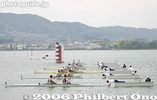
Starting line
|
|

Most races were not close.
|
|
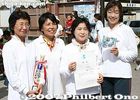
The BL Club C team placed 2nd in the Masters Women's Category. マスターズ女子の部 2位 BLクラブC
|
|

Otaka Tokio, Chairman of the National Federation of Shiga Kenjinkai, delivers a welcome message. 大高時男
|
|

The boat is pencil-thin.
|
|

Seta-no-Karahashi Bridge over Seta River
|
|
|
|
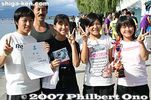
The SAKURA team placed 2nd in the Family category. ファミリーの部 2位 SAKURA
|
|

Dehara Itsuzo, Shiga Prefectural Assembly Chairman
|
|

Rinsing the oars.
|
|
|
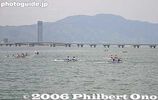
Two-man boat race
|
|

The 250-meter course is very short, and each race ends within a minute or two.
|
|

3rd place winner in the Masters Men's Category. マスターズ男子の部 3位 大歯大松籟会B
|
|

A representative for Mekata Makoto, Chairman of the Shiga Prefecture City Mayors' Association and also the mayor of Otsu.
|
|
|
|
|

Cheering/coaching from bicycle
|
|

Finish line. In the background is the Kyoto University Rowing Club's boat house.
|
|

The BL Club B team placed 2nd in the Women's Category. 一般女子の部 2位 BLクラブB
|
|

Natsuhara Satoru, Chairman of the Shiga Prefecture Town Mayors' Association and also the mayor of Taga town.
|
|
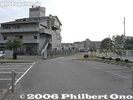
Entrance and road to the rowing clubhouse
|
|
|

Cheering/coaching on foot
|
|
|

The Shiga University Education Dept. B team placed 3rd in the Women's Category. 一般女子の部 3位 滋賀大教育B
|
|

The Lieutenant Governor of Shiga (substituting for Governor Kada who was hosting the Emperor and Empress visiting Shiga) bestows awards to people who have long contributed to promoting Shiga.
|
|
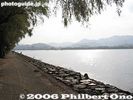
Near the rowing club is the Lake Biwa Rowing Course where regattas are held. 滋賀県立琵琶湖漕艇場
|
|
|

The race had to be stopped for a few minutes each time this cruise boat passed by.
|
|

Writing the winning team's name on the award certificate (one per team). Students from Doshisha University Rowing Club served as volunteer staff.
|
|

Chairman Otaka gives letters of appreciation to Shiga Kenjinkai members for meritorious service. In the afternoon, the keynote speech was given by Donald E. Devaney who talked about historical ties between Shiga and the U.S. (photography was not allowed).
|
|

Awards ceremony
|
|

The Lake Biwa rowing Song CD was also sold.
|
|

Sports Masters poster. The annual Sports Masters national competition was held in Shiga in 2007. This regatta was a supporting event instead of an official competition.
|
|

In an adjacent hall was the "Social Salon" with exhibits by most of Shiga's cities and towns and by various Shiga Kenjinkai. Many tourist pamphlets (mostly in Japanese) were provided.
|
|
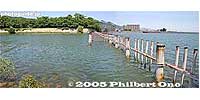
Water intake for Lake Biwa Canal No. 2. The Lake Biwa Canal (Biwako Sosui) supplies water from Lake Biwa in Otsu to Kyoto. After four years of monumental construction, the canal was completed in 1890.
|
|

Boat landing
|
|

Mihogasaki harbor, Otsu. The arrow points to the boat house where Oguchi Taro and crew departed for their rowing trips.Mihogasaki is accessible by bus from Otsu Station. Or just walk west from Hama-Otsu. This is also where water from the lake is drawn into the Biwako Canal's first canal which feeds water to Kyoto.
|
|
|
|

Lake Biwa Rowing Course clubhouse, in front of which the awards ceremony was held. It is next to the finish line. The facillity is operated by Shiga Prefecture.
|
|

Hikone's exhibit in the Social Salon, featuring red samurai armor from the Ii clan.
|
|
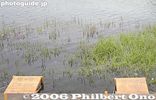
Temporary boat landing
|
|

The Lake Biwa rowing Song CD was also sold during the regatta which lasted from 9 am to 4 pm.
|
|

Lake Biwa Rowing Course boathouse
|
|

National high school soccer tournament award from Yasu. (Yasu High School won the national title in Jan. 2006.)
|
|

Carrying the boat back
|
|

Mihogasaki harbor, Otsu. The arrow points to the boat house.
|
|

CDs
|
|

Lake Biwa Rowing Course boathouse
|
|

Exhibit by Takashima city.
|
|

Sketch of regatta course
|
|
|
|

Dragon boat
|
|
|
|

Overseas Shiga Kenjinkai exhibits.
|
|
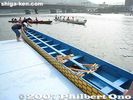
Dragon boat
|
|
|

Shiga Kenjinkai from Canada and Mexico.
|
|

Verse 1 Lyrics (Otsu) 一番の英訳(大津). School logo on boat house, a cherry blossom with three stripes for Dai-san Koto Gakko.We're children of the lake, off to wander 'round.
This journey fills my heart with, intense happiness.
Rising mist evaporates, ripples come and go.
Shiga's Miyako dear, bid farewell for now.
われは湖の子 さすらいの
旅にしあれば しみじみと
のぼる狭霧や さざなみの
志賀の都よ いざさらば
Ware wa Umi no Ko, sasurai no
tabi ni shiareba, shimijimi to
Noboru sagiri ya, sazanami no
Shiga no Miyako yo, iza saraba
--
This first verse refers to the start of the journey of life. The lake mist symbolizes the uncertainty of what lies ahead.
The capital of Shiga is Otsu, where they departed from Mihogasaki boat harbor on June 27, 1917. For some reason, the kanji characters for "Shiga" is incorrect for Shiga Prefecture.
|
|

Free rides on this dragon boat were also provided.
|
|
|

Niigata Shiga Kenjinkai exhibit included stuff from Hokuriku region. Web site here.
|
|

Dragon boat
|
|
|

Exhibits by other Shiga cities.
|
|
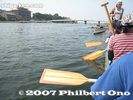
Rowing on the dragon boat
|
|

Shiga Prefecture exhibited some plastic fish.
|
|

Dragon boat going to the Seta-Karahashi Bridge.
|
|

Biwa masu trout above, and nigorobuna crucian carp (funazushi) on bottom.
|
|

Water intake for Lake Biwa Canal No. 2
|
|

Reeds bid rowers farewell for now...
|
|
|

Caffy, official mascot for the Sports Recreation event in 2008.
|
|

Sleek racing row boats and traditional yakata picnic boats on upper right
|
|

A taiko drummer sits at the front of the dragon boat.
|
|

Popular Hiko-nyan from Hikone also made an appearance in the Social Salon.
|
|
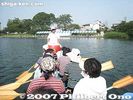
We rowed according to the taiko drum beat.
|
|

Rear of boat house, now used by a private boat club.
|
|

View of Seta River race course, Karahashi Bridge on far left. Tokyo vs. Kyoto Univ. Regatta
|
|

Hiko-nyan is a helmeted cat, related to the Ii clan.
|
|

Writing names on award certificates.
|
|

On Nov. 13, there was a symposium called "Shiga and Cultural Exchanges."
|
|

Alumni race starting at Seta no Karahashi Bridge
|
|

Some of the prizes awarded to the 1st, 2nd, and 3rd place winners. Notice the Lake Biwa Rowing Song CDs (75 copies).
|
|

One panelist was a priest from Enryakuji temple on Mt. Hiei.
|
|
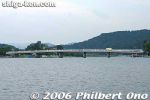
Seta Karahashi Bridge
|
|

Awards ceremony
|
|

The Social Salon was a good place to hang out between meetings and symposiums. It also had mini presentations by several overseas Kenjinkai.
|
|

Race course at the head of Seta River where it meets Lake Biwa. 1000-meter course with 6 lanes.
|
|
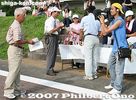
A representative from each winning team went to receive a medal and Lake Biwa Rowing Song CD. Each team had 5 members, so 5 CDs per team.
|
|

Interesting slide show by the Southern California Shiga Kenjinkai showing their activities.
|
|
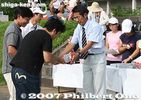
The Lake Biwa Rowing Song CDs were donated by Philbert Ono.
|
|

A comedian from Mt. Ibuki in Maibara.
|
|
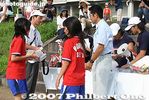
The junior category team receive their medals and CDs.
|
|

Dinner banquet hosted by Shiga Prefecture on Nov. 13, 2007.
|
|

Governor Kada Yukiko gives a welcome message in both Japanese and English. In Japan, extremely few politicians can do this. Nice that Shiga has a bilingual governor who once studied in the U.S.
|
|

My video of Okinawan dances like yotsudake and a karate dance.
|
|

The beautiful 15-page program included an ad for the Lake Biwa Rowing Song CD.
|
|

Water intake for Lake Biwa Canal No. 2
|
|

View of Seta River race course from Karahashi Bridge
|
|

Kanpai!
|
|

Yotsudake, Okinawa's most famous dance. 四つ竹
|
|

Buffet
|
|

Dancer: Nariko Miyagi
|
|

Koto entertainment by Maiko, a well-known singer-songwriter from Shiga. 真衣子
|
|

Okinawan kimono called the bingata, perhaps Okinawa's most famous kimono. The design is made by applying dyes through a stencil.It was originally worn by Okinawa's royal family members. It is now the costume of a slow-moving Okinawan dance called "Yotsudake."
Model: Maki Uyeunten
|
|

Back view of yotsudake dancers on stage.
|
|

On the morning of Nov. 14, a boat cruise on the Michigan. Narration in both Japanese and English explaining about Lake Biwa's ecology. I was unable to join this cruise, so no photos.
|
|

In the afternoon of Nov. 14 was a "Youth Session," or panel discussion by representatives of various Kenjinkai overseas. They discussed about recruiting younger members and facilitating networking among members.
|
|

Questions from the audience were also taken.
|
|

Social Salon also served green tea and sweets.
|
|
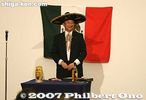
Mini presentation by the Biwako-no-Kai from Mexico.
|
|

Door prizes were given out in a drawing. There were so many prizes donated by various Kenjinkai that it took almost an hour to give them all out.
|
|

Final dinner on Nov. 14, 2007. Some wore happi coats or a kimono.
|
|

Verse 2 Lyrics (Omatsu/Omi-Maiko) 二番の英訳(雄松"Pine trees are very green, on sands very white.
Omatsugasato is, a young maiden's home.
Bush of red camellia, hides her teary face.
She's weeping o'er a lost love, much too short to last.
松は緑に 砂白き
雄松が里の 乙女子は
赤い椿の 森蔭に
はかない恋に 泣くとかや
Matsu wa midori ni, suna shiroki
Omatsugasato no, otomego wa
Akai tsubaki no, morikage ni
Hakanai koi ni, naku toka ya
Omi-Maiko is still famous for white sand beaches and pine trees. In summer these beaches are cluttered with people trying to get a tan.
See more photos of Omi-Maiko here.
|
|

For the first hour (6 pm - 7 pm), we suffered through endless speeches by politicians. (Speeches should not be longer than 20 min. total at any event.)
|
|
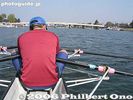
Rowed all the way to Seta Karahashi Bridge and the shinkansen tracks. It was my first time rowing on a competitive rowing boat, and not too difficult even for a beginner.
|
|

Speech by Kunimatsu Yoshitsugu, Chairman of the Shiga Intercultural Association for Globalization.
|
|

"Pine trees are very green, on sands very white." Omi-Maiko
|
|

Kunimatsu Yoshitsugu, Chairman of the Shiga Intercultural Association for Globalization. He is also the former Shiga governor.
|
|

Kanpai!
|
|

White sands of Omi-Maiko (Omatsu), Otsu, Shiga
|
|

Food, finally! All from Shiga. Lots of fish, and funa-zushi too.
|
|

Entertainment started with taiko drumming.
|
|

Ripples lap white sands of Omi-Maiko.
|
|

Governor Kada teaches us how to dance the Goshu Ondo, a native dance of Shiga. She spoke in both Japanese and English again. Also see the video at YouTube.
|
|

Almost everyone got up to dance the goshu ondo. It's like a bon dance peculiar to Shiga. Also see the video at YouTube.
|
|

Pine trees at Omi-Maiko
|
|

Goshu ondo
|
|

Members of the Toronto Shiga Kenjinkai dance goshu ondo.
|
|

At the end, we sang Biwako Shuko no Uta (Lake Biwa Rowing Song). The party ended at 9:30 pm.
|
|

Kyoto University Rowing Club arrive at Omi-Maiko in Aug. 2006 during their annual Lake Biwa rowing trip.
|
|
|

Omatsu "Famous Place" marker
|
|
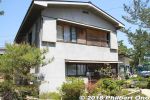
Omatsukan ryokan at Omi-Maiko. This is where Oguchi Taro and rowing mates stayed when they rowed around Lake Biwa. 雄松館
|
|

Todai and Kyodai coming round the bend
|
|

Kyoto Univ. goes on to win the main race of the day in 10 min. 11 sec., over 20 sec. ahead of Todai.
|
|
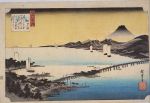
Hiroshige's woodblock print of Evening Glow at Seta from his "Omi Hakkei" (Eight Views of Omi) series.
|
|
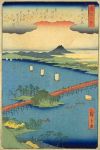
Hiroshige's woodblock print of Evening Glow at Seta from his "Omi Hakkei" (Eight Views of Omi) series.
|
|

Seta no Karahashi Bridge (stone sign) and Seta River. This was before the bridge got a new paint job in 2012. 瀬田の唐橋
|
|
|

Gallery Karahashi is a fine-art rental gallery near Seta Karahashi Bridge ギャラリー唐橋
|
|

Entrance to Seta Karahashi Bridge, west end. MAP
|
|

Crossing Seta Karahashi Bridge
|
|

Water intake for Lake Biwa Canal No. 2
|
|

Water intake for Lake Biwa Canal No. 2. The canal is covered. The water supply for Kyoto and Osaka.
|
|

Water intake for Lake Biwa Canal No. 2. This is the second, almost parallel canal constructed in 1912.
|
|

Water intake for Lake Biwa Canal No. 1
|
|

Water intake for Lake Biwa Canal No. 1 at Mihogasaki
|
|

Water intake for Lake Biwa Canal No. 1. Kyoto was thereby revitalized with electric power and a stable water supply. A second, almost parallel canal for drinking water was also constructed in 1912.
|
|

Sinking yakata-bune boat
|
|
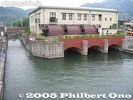
Lake Biwa Canal No. 1
|
|

Lake Biwa Canal No. 1
|
|
| 2819 files on 12 page(s) |
1 |
 |
 |
 |
 |
|